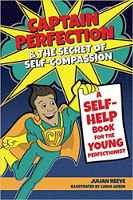
Image by Kranich17
Narrated by Marie T. Russell
Video version at the end this article
I’d just conducted a performance of the Broadway musical Hamilton in San Francisco in 2017 when I experienced a heart attack on my way home. Tests proved that my right coronary artery was 90% blocked, and two stents were placed to get me on the road to recovery.
I was 43 years old.
Work with a psychologist would later identify stress as the main cause of the attack. It would also uncover perfectionism as its silent partner. My own endless demands (and dubious lifestyle choices) driven by my bullying inner critic and fear of professional failure had finally taken their toll.
Finding A Healthier Balance
Thankfully, I’d cleaned up my lifestyle several years earlier, but I needed a different approach to my work, one that would enable me to find a healthier balance between my perfectionism and the incredibly high standards that came with being the music director of the world’s most popular musical!
My psychologist introduced me to self-compassion, a proven technique that moderates the link between perfectionism and depression and helps perfectionists manage their traits in healthier ways. It proved to be a game changer.
Here’s what I learned:
1. Self-compassion is more than just being kind to yourself
Self-compassion is made up of three elements:
* Self-kindness: where we learn to be warm and understanding toward ourselves.
* Mindfulness: where we discover how to observe thoughts and feelings as they arise without suppressing, denying, or reacting to them.
* Common humanity: where we recognize that suffering and imperfection are part of the human experience.
Put simply, self-compassion is “the art of being kind to yourself” and treating yourself as you would others.
2. Practicing self-compassion doesn’t make us weak or lazy
Many perfectionists believe that being kind to ourselves will somehow undermine our high standards, and there is a common misconception that it also makes us vulnerable to laziness.
This isn’t true.
The standards that perfectionists hold for themselves and others are intrinsically stitched into our DNA. We will always want the best results possible, and the practice of self-compassion will do little to change those demands.
What self-compassion will do is soften the blow when we inevitably fail in some of our pursuits, and it will open the door to healthier ways to manage our perfectionism. Dr. Kristin Neff, a leading expert in self-compassion, puts it perfectly when she says: “Self-compassion allows us to turn toward and face the difficult feelings that arise when considering our own mistakes and misdeeds, meaning that we can see ourselves more clearly and do what’s needed to make things better.”
3. Self-compassion actually makes us more productive
Self-compassion not only enables us to manage our perfectionism in healthier ways, but it also helps us become more productive. When we’re compassionate, the parasympathetic nervous system—the body’s built-in system that calms us down—switches on, which leads to higher creativity. More blood flows to the prefrontal cortex, the part of the brain that does most of our thinking, and a hormone called oxytocin flows more freely, helping us maintain lower levels of stress.
4. No one is perfect, so give yourself a break
Perfectionists find it really difficult to connect with this concept; merely admitting the truth of this statement makes us feel vulnerable and question the values we hold for ourselves and others.
Embracing self-compassion helps us realize that imperfection is part of the shared human experience, something we all experience rather than something that only happens to us alone. It helps us develop the tools needed to be kinder to ourselves when we make mistakes, which, in turn, helps us deal with the fact that we’re not perfect and never will be.
5. The journey is as important as the destination
Perfectionists are often so focused on the result of the task at hand that we’ll completely ignore the experience of achieving it. When you then consider that we’re very likely to be unsatisfied with the results we produce, it’s easy to understand why perfectionism is so closely associated with depression and burnout. It’s a thankless task—unless we change our thinking.
Self-compassion encourages us to find joy in the experience of whatever we’re trying to perfect rather than rely on the result to satisfy us. It promotes the practice of looking after ourselves so that we can be the best we can be.
More Benefits of Self-Compassion
These are all great examples of how self-compassion helped me get on a healthier road with my perfectionism, but it’s only a snapshot of its power. Speaking to ourselves compassionately forces our inner critic to be less present, freeing us to focus on the tasks at hand. That same language encourages us to embrace forgiveness, celebrating what we achieve, not berating what we don’t.
Ultimately, self-compassion teaches us that we are worthy, that there is no need to compare ourselves to others because what we have inside us is enough.
Self-compassion takes time to learn and implement into our lives, but it can produce incredible results. Its worked wonders for me. It can work for you, too.
Copyright 2021. All Rights Reserved.
Book by this Author
Captain Perfection & the Secret of Self-Compassion: A self-help book for the young perfectionist
Written by Julian Reeve, Illustrated by Carol Green
 Self-compassion is ‘the art of being kind to yourself’ and is proven to help perfectionists manage their thoughts and behaviors in healthier ways. This self-help book inspires children (ages 6+) to understand their perfectionism before encouraging them to build their very own ‘self-compassion superpower’, a valuable resource when unhealthy perfectionism hits.
Self-compassion is ‘the art of being kind to yourself’ and is proven to help perfectionists manage their thoughts and behaviors in healthier ways. This self-help book inspires children (ages 6+) to understand their perfectionism before encouraging them to build their very own ‘self-compassion superpower’, a valuable resource when unhealthy perfectionism hits.
Featuring fun stories, amazing exercises, and proven techniques, Captain Perfection and the Secret of Self-Compassion is the perfect self-help book for young perfectionists!
For more info and/or to order this book, click here. Also available as a Kindle edition.
About the Author
 JULIAN REEVE is a former music director of the Broadway musical Hamilton turned perfectionism contributor, and speaker.
JULIAN REEVE is a former music director of the Broadway musical Hamilton turned perfectionism contributor, and speaker.
He recently published his first book, Captain Perfection & the Secret of Self-Compassion, a self-help book for young perfectionists that empowers children to develop healthy management techniques for their maladaptive perfectionism through self-compassion.
Visit JulianReeve.com for more information on self-compassion and other perfectionism solutions.






















